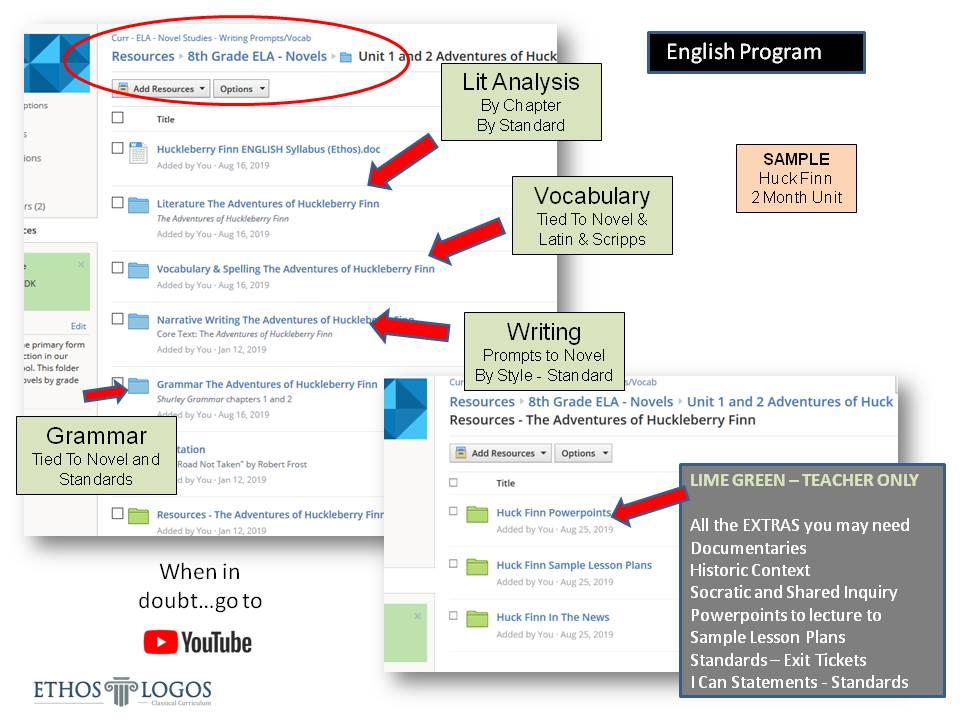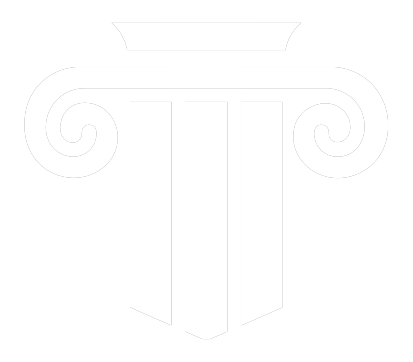Intentional By Design - Perfected In The Classrooms
The Ethos Logos Curriculum, ELA scope, and sequence use Classical Novels as it's foundation and supplements with research-backed early reading programs that guide our schools on their journey to build life long readers.
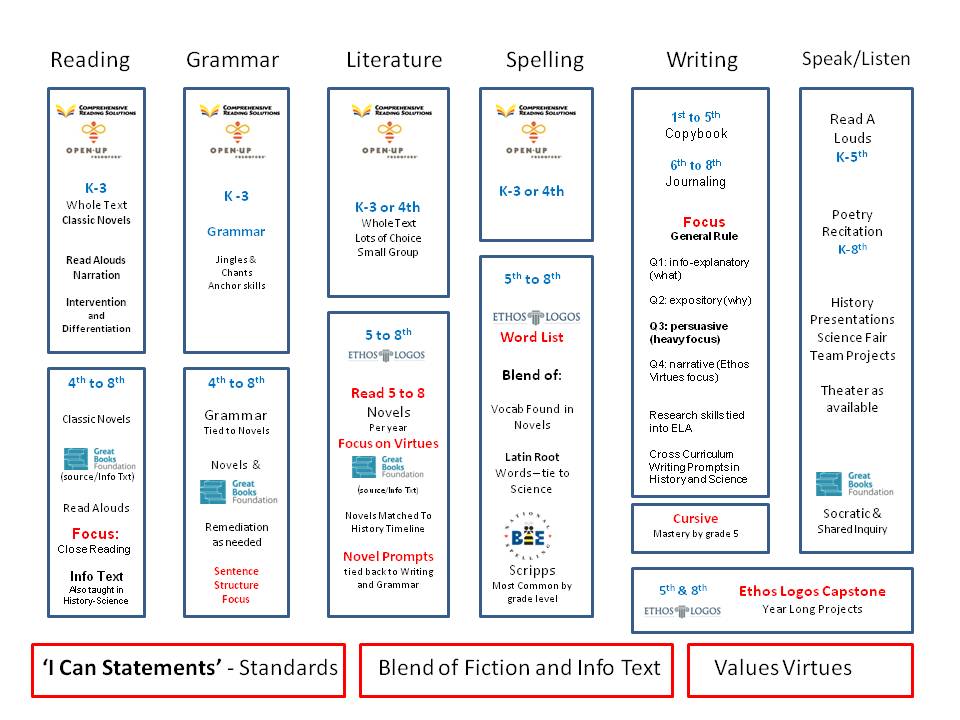
Ethos Logos English Program (K-8)
In the K-3 or 4th grade ELA program, we have found to be the most effective and in alignment with the Classical Model of hands-on, deep and rich literature, is a program developed by Dr. Sharol Walpole from the University of Delaware. The second edition added in additional writing lessons. With these additions, Bookworms has become our go-to choice for a foundational ELA program. Here's a great analysis from Aligned and authors; David Liben, Meredith Liben, Sue Pimentel.
Bookworms foundational skills program is research-based. It guides students systematically in decoding the spelling sound patterns in English—essential for becoming a fluent reader. Every student is regularly diagnosed to determine her phonological awareness and decoding and fluency levels. Then, during the Differentiated Skills Block, the program provides each student with particular instruction and materials, including decodable text sheets as needed (regardless of grade level). Addressing older students’ skill deficits is one reason for the remarkable growth Bookworms districts are experiencing. Another is that all students, those who are fluent at grade-level work and those who aren’t yet, are encouraged to read widely, freely choosing texts from the classroom library. Every child gets what he or she needs.
Bookworms also deserves praise for its approach to close reading. Struggling readers traditionally have not been allowed to experience reading grade-level rich complex texts, but Bookworms engages all students in reading grade-appropriate text multiple times daily for different purposes. This includes shared reading and the continuance of interactive read alouds up through grade five—of value for all, but particularly helpful for struggling readers.
We chose Bookworm because it is a system that lines up with Classical Education and is research-backed and has demonstrated effectiveness in teaching emergent readers. Here are the top 10 reasons that we like and recommend Bookworms to all our schools:
1. Balanced Literacy - fiction and non-fiction. This program starts building background knowledge through information and the power of the story. Background context, which is achieved learned at school and home to comprehension and deeper learning. (HERE, HERE). Classical Education's focus on history, the arts, sciences and great works of literature help to build background knowledge for a lifetime of learning.
2. Heavy focus on real books that are leveled and readily available. These are NOT proprietary books from a large publishing house. The classroom library is made up of classical and time tested books that align with what the scholars are learning about in history and science. The library can be customized to the teacher and the region of the country.
3. Use of songs, jingles, and chants to anchor concepts (the research HERE, HERE, HERE, HERE )
4. Incorporation of read alouds into the ELA block. (Oh so very Charolette Mason!)
5. Vocabulary expansion through reading. Spelling lists are based on the content being covered in the core ELA classes.
6. Phonetic Incorporated in early grades in addition to Whole Word. (a good summary of the debate (which has been going on in education for decades) of how children learn to read can be found - HERE)
7. Group discussions and Socratic prompts. Three-time blocks in the ELA program allow for small group, differentiation and writing/spelling/grammar blocks.
8. Prompts for values and virtues themes included in the program. Not an afterthought or 'One More Program' to get to.
9. Shared Reading, with small group and whole class and one on one time with the teacher to give the needed individual attention. Differentiation Options Prescribed within the classroom. Dedicated support and time for targeted differentiation.
10. Kids need routines. The schedule blocks are consistent and there is a pattern that the kids can look forward to.
In the early grades, the additional support includes narration materials, grade-appropriate poetry for recitations and additional classical literature selections.
For grades 4th to 8th, the ELA program is also delivered by Ethos Logos and based on 7 to 8 classical literature novels based on the time frame studies. These novels have a Lexile reading level that is just above grade level. From the novel study, the curriculum program has customizable lessons to address the major components of an English program.
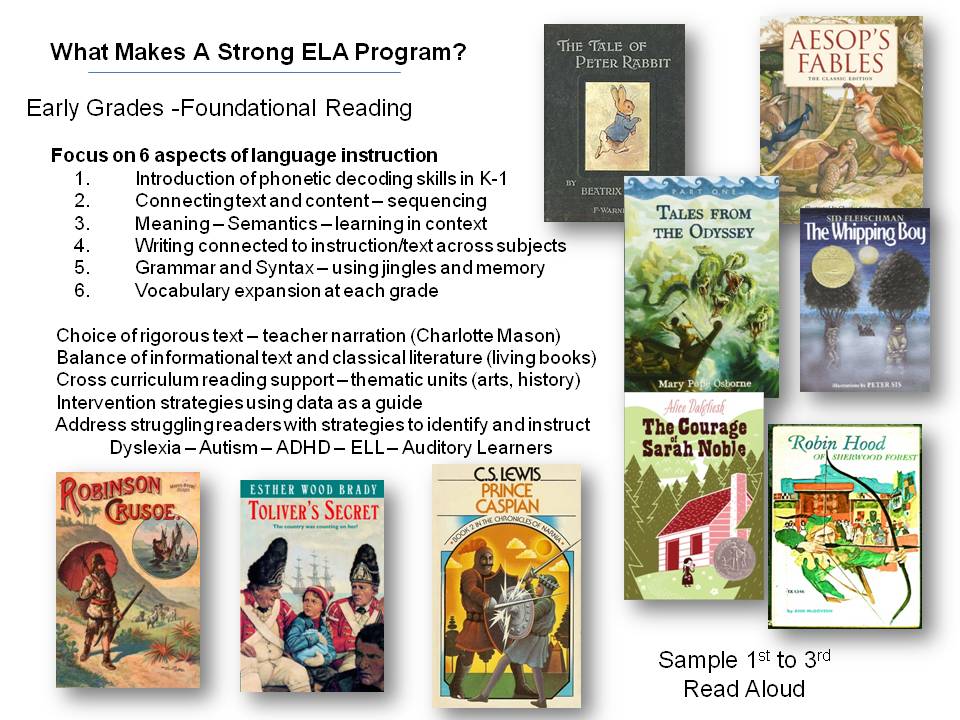
Each novel has a featured writing prompt (Argumentative/Persuasive, Explanatory/Informative, Narrative and Research), that the scholars work on from prompts in the novel. These writing prompts are also scheduled into their history instruction and when appropriate into science, music, and art. In addition to writing, teachers follow the scaffolded standards for literary analysis, grammar, vocabulary and presentation skills.
Scholars have a grade-appropriate poem that they recite individually and as a class starting in Kindergarten and continuing to 8th grade. Informational text and close reading instructions are supplemented to the novel study and introduced in history class to prepare scholars for an end of year state assessment.
Heggerty Phonemic Awareness - Whole Word AND Phonemic Instruction
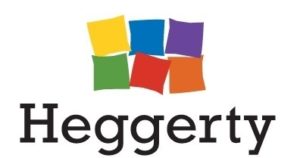 Heggerty curriculum will be prescribed into the first semester of Kindergarten and 1st grade to as an intervention tool for struggling readers. The two best predictors of early reading success are alphabet recognition and phonemic awareness. (Adams, 1990). Ethos Logos Classical Curriculum has identified the gaps in Journeys English and successfully implemented the Heggerty Phonemic Awareness supplements in other Classical schools.
Heggerty curriculum will be prescribed into the first semester of Kindergarten and 1st grade to as an intervention tool for struggling readers. The two best predictors of early reading success are alphabet recognition and phonemic awareness. (Adams, 1990). Ethos Logos Classical Curriculum has identified the gaps in Journeys English and successfully implemented the Heggerty Phonemic Awareness supplements in other Classical schools.
Phonemic awareness is the most important factor in separating normal and disabled readers. (Adams, 1990) Phonemic awareness has been shown to be a very powerful predictor of later reading achievement. In fact, it [phonemic awareness] is a better predictor than more global measures such as IQ or general language proficiency. (Griffith and Olson, 1992) Phonemic awareness is the most potent predictor of success in learning to read. It is more highly related to reading than tests of general intelligence, reading readiness, and listening comprehension. (Stanovich, 1986, 1994). The Heggerty tool is available to all K to 3rd grade teachers and the intervention team should literacy assessment find a need to supplement for struggling readers.
Shurley Grammar - Foundational Learning Through Song
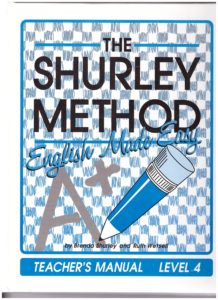 Shurley Grammer will be the grammar program for 4th grade to 6th grade with option addition to 7th and 8th depending on the skill set of incoming scholars. Research has shown one of the essential features of Shurley Grammar, the ongoing use of feedback through formative assessments. Providing scholars with information about how well they are doing on a regular basis was found to be effective in student achievement, so much so that researcher John Hattie analyzed nearly 8,000 studies and concluded, “The most powerful single modification that enhances achievement is feedback. The simplest prescription for improving education must be ‘dollops of feedback.’” Research found that the effects of feedback could increase achievement from 7 to 37 percent. The continuous use of feedback with Shurley Grammar should provide significant scholar improvement in the writing skills of our target population.
Shurley Grammer will be the grammar program for 4th grade to 6th grade with option addition to 7th and 8th depending on the skill set of incoming scholars. Research has shown one of the essential features of Shurley Grammar, the ongoing use of feedback through formative assessments. Providing scholars with information about how well they are doing on a regular basis was found to be effective in student achievement, so much so that researcher John Hattie analyzed nearly 8,000 studies and concluded, “The most powerful single modification that enhances achievement is feedback. The simplest prescription for improving education must be ‘dollops of feedback.’” Research found that the effects of feedback could increase achievement from 7 to 37 percent. The continuous use of feedback with Shurley Grammar should provide significant scholar improvement in the writing skills of our target population.
The main reason Shurley English was chosen was its use of chants and jingles in aiding scholars in memorizing. This is in line with our philosophy on the ability of young children to memorize basic facts and fundamental rules and to absorb information and knowledge more easily at a younger age.
- Utilizes all learning styles: visual, auditory, kinesthetic.
- Never teaches isolated concepts.
- Incorporates scholar/teacher interaction.
- Uses repetition to attain mastery.
- Challenges accelerated scholars.
- Promotes higher-order thinking.
- Provides the connection between grammar skills, writing, and effective speaking.
Intervention (Early Reading) and Dyslexia Scholar Adaptations in ELA
Audio options are available for dyslexic students. There are dozens of powerpoints to use as lecture guides. Short and long documentaries on the book or time period are built into all ELA and History units so the teacher can reach today’s visual students in a multi-sensory fashion.
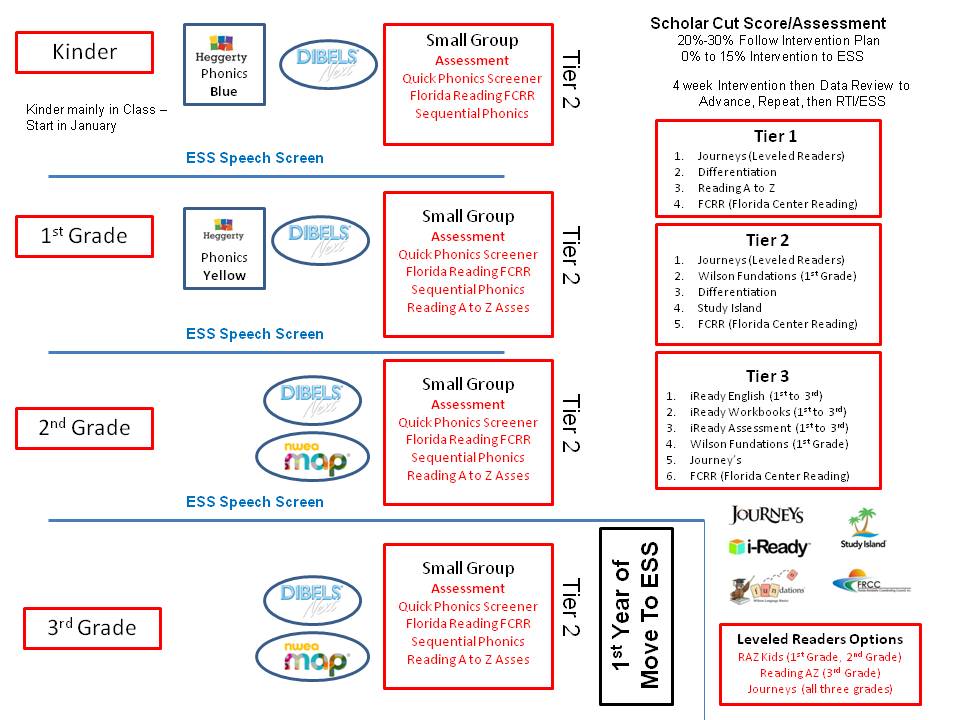
Snapshots of 5th Grade ELA at an Ethos Logos School
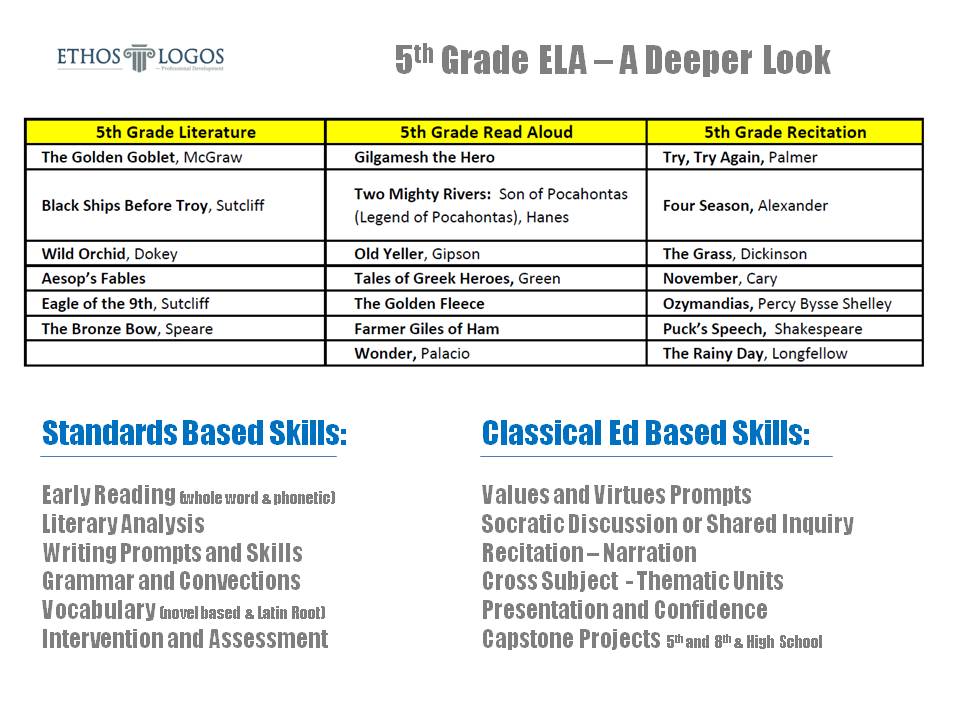
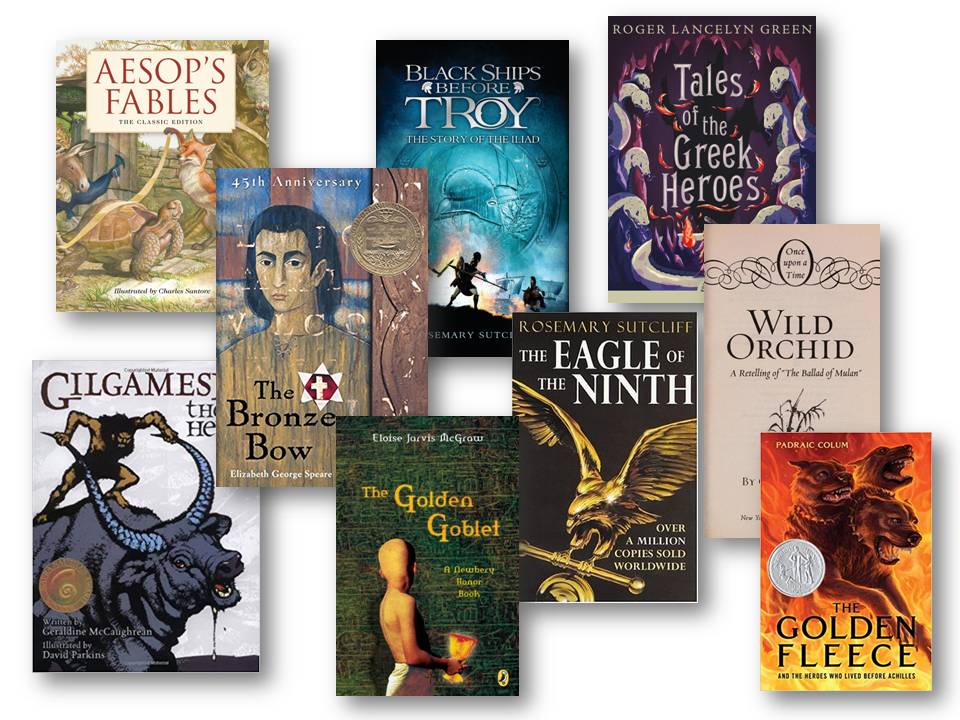
The above ELA diagram lists the classic works of literature which the 5th grade ELA instruction is built around. The time period the students are covering in 5th grade is the Ancient civilizations from Mesopotamia to the Fall of Rome. The book collections align with what is being taught in history and science.
As an example, during the Black Ships Before Troy, a two-month unit, the teacher has options for ready built and provided for them or the teacher can build their own lessons with a buffet of items to help make the novel come alive. Each novel has;
- Writing prompts that focus on Narrative/Explanative, Argumentative/Opinion, Expository or Research writing prompts, a tied to prompts in the novel as well as source documents found in the Great Books Foundation text.
- Grammar Skills are pulled from the novels being studied and aligned to State standards. If the teacher sees that the students need additional work on a grammar concept from 5th grade or from a prior year, there is a resource bank with hundreds of grammar worksheets that can be brought in as supplementation. All these tools are at the teacher's disposal for every grammar skill from K to 12.
- Literary Analysis is loaded into the Ethos Logos curriculum in a chapter by chapter format, all aligned to State standards. The Exit Tickets define what the students should master at the 5th-grade level and the teacher can once again use the pre-built lesson outlines or use any of the resources (powerpoints, compare contrast prompts) at their disposal.
- Vocabulary is a mix of Scripps high frequency, grade aligned words, a Latin root word group to focus on (aligned with science), and vocabulary directly from the books being studied.
- Historical background on the Author, the period the book is set, or the impact the novel made in history are all built into the 72 novels that are covered in the Classical model from K to 12. For example, during the 8th-grade novel, Huckleberry Finn, there are interviews from 60 Minutes on the controversy of the novel in modern-day as well as long-form radio interviews with Harper Lee. These historical add-ins allow a teacher to put a novel into the context of its historic significance. The WHY of reading the great works.
- Socratic question prompts help the teacher start the deep discussions which are a hallmark of Classical Education. Socratic lesson prompts are sprinkled throughout the Ethos Logos curriculum. In ELA, Science, History and in some cases Art, the teacher will find prompts or big questions to use as lead-ins to Socratic discussions. These discussions will happen from Kindergarten all the way to graduation. In addition to the prompts, our PD department spends the time to show teachers the art of a good discussion. Their portfolio of work and additional compensation is tied to a teacher's ability to master the skill of Socratic learning.
- Value and Virtue prompt that helps a teacher to embed the align with the monthly focus which is being covered school-wide. These prompts may be in the form of writing assignments, Socratic discussions or small group analysis. Ask most teachers why they chose the profession of teaching and undoubtedly you will hear their desire to impact individual students and their communities. Study after study including a recent survey of 3,000 teachers, (Ni and Rorrer, 2018) results point to the top three areas that rise to the top for the WHY of a teacher.
- Desire to make a worthwhile difference in the lives of children (85%)
- Desire to contribute to the greater societal good (70%)
- Experience working with children/young adults (64%).
The Values and Virtues instruction, and giving teachers the permission and time to make the deep connections with their students is the secret sauce of why Ethos Logos schools will attract and retain top teachers and parents/students chose our schools.
Curriculum + Teacher Effectiveness + Intervention = Reading Success
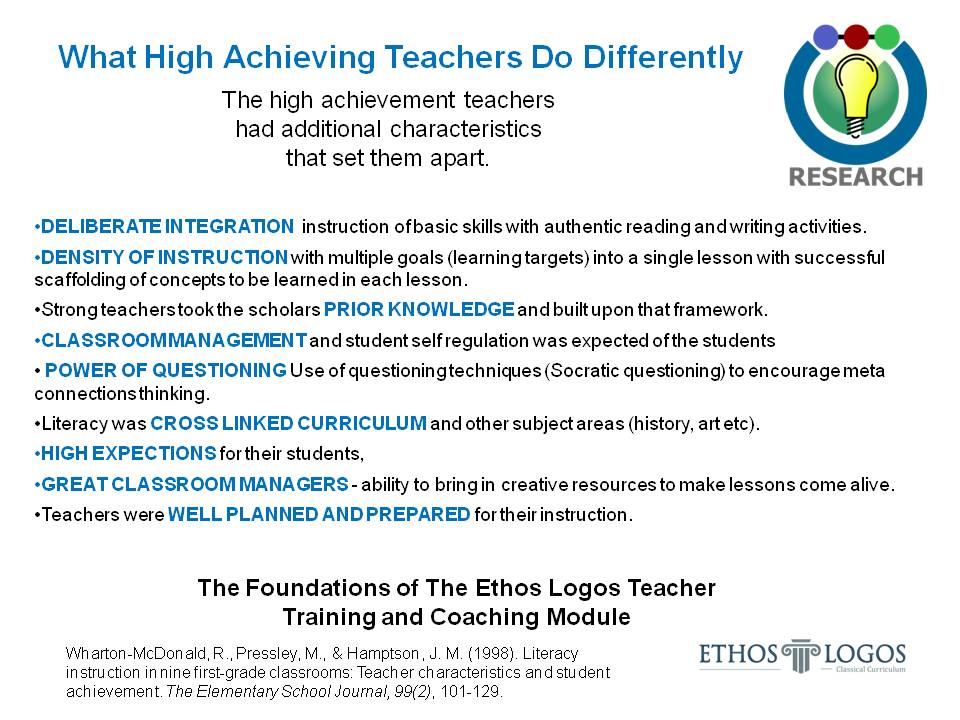
The Great Books Foundation in K-8
Informational Text and Source Documents
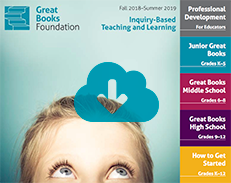 Overlaid on the novel studies are Great Book Foundations resources which provide analysis and interpretation of poems, short stories, plays, informational text, source documents and more. The Great Books Foundation provides teachers with training in the Shared Inquiry method which functions much like a Socratic discussion but the teacher is leading and directing the discussion. The Great Books Foundation curriculum tools are aligned to the theme or time frame of the novels being studied in order to keep the thematic learning benefits in place.
Overlaid on the novel studies are Great Book Foundations resources which provide analysis and interpretation of poems, short stories, plays, informational text, source documents and more. The Great Books Foundation provides teachers with training in the Shared Inquiry method which functions much like a Socratic discussion but the teacher is leading and directing the discussion. The Great Books Foundation curriculum tools are aligned to the theme or time frame of the novels being studied in order to keep the thematic learning benefits in place.
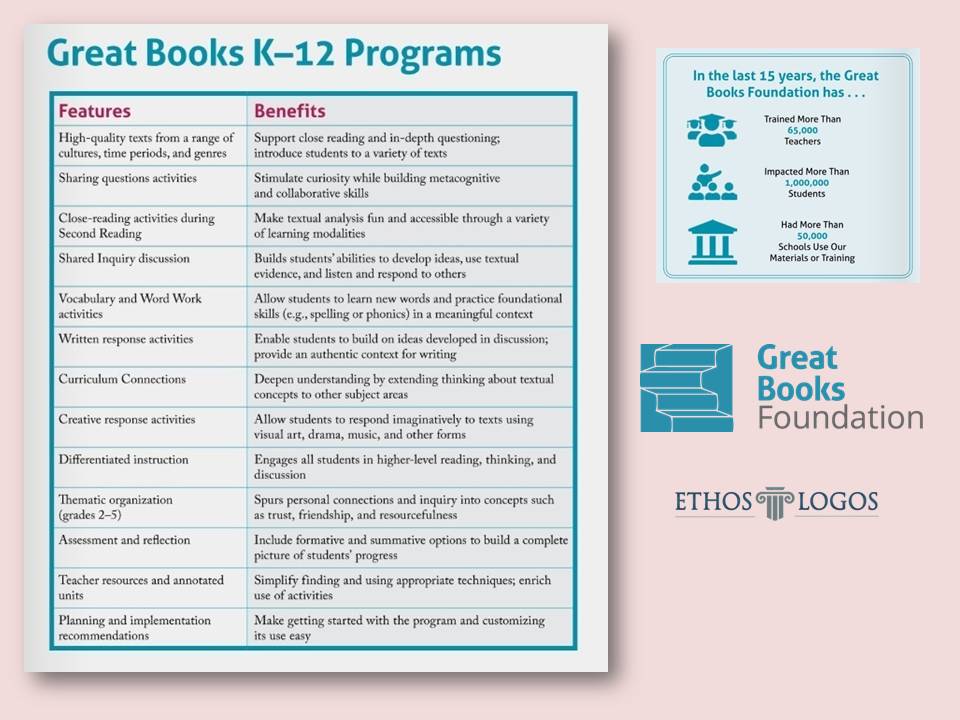
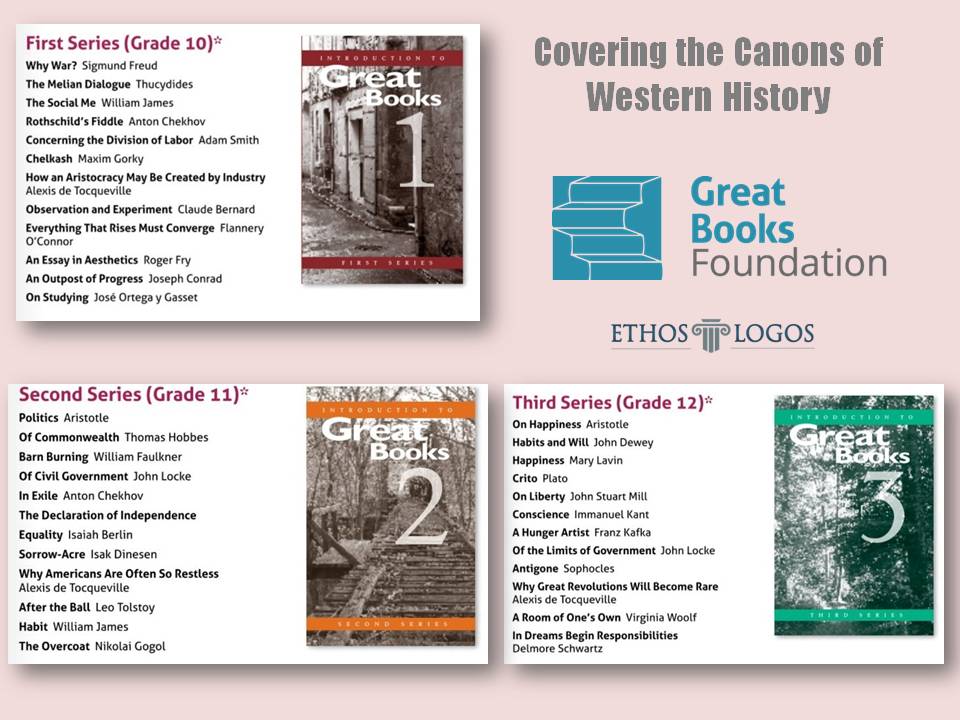
Ethos Logos works with the 70-year-old Great Books Foundation for content, lesson planning and professional development on their Shared Inquiry model. The program is rooted in the great works of classical literature and implements teacher based inquiry techniques that have been proven to increase reading comprehension and writing skills in elementary students. The power of the program is in Collaborative Discussion Guided by Authentic Questioning from a trained teacher.
Applebee, A. N., Langer, J. A., Nystrand, M., & Gamoran, A. (2003). Discussion-based approaches to developing understanding: Classroom instruction and student performances in middle and high school English. American Educational Research Journal, 40(3), 685–730.
A Sample 6th Grade ELA Unit - The Hero's Journey
This is an example of an ELA unit that is built into the 6th grade English module. This four-month unit, covers two time periods, the Middle Ages and over to the East during the same time period. The novels are the foundational works that have literary analysis, writing prompts, vocabulary and grammar exercises built-in. As the students are reading King Arthur and His Knights of the Round Table and Samurai's Tale (the Disney Mulan story), they are also exploring the Hero's Journey unit. Inside the Ethos Logos curriculum, there are detailed lessons and support materials that expose the students to short stories, poetry, informational text, and historic documents all surrounding the Hero's Journey. The detailed lesson planning helps the teacher to focus on delivering and engaging the teaching, instead of building from scratch, of these complex connections.
These Great Book Foundation and other Add On Themed Units are added into the scope and sequence of our curriculum mapping and can easily be adjusted based on the level of the students and time available.
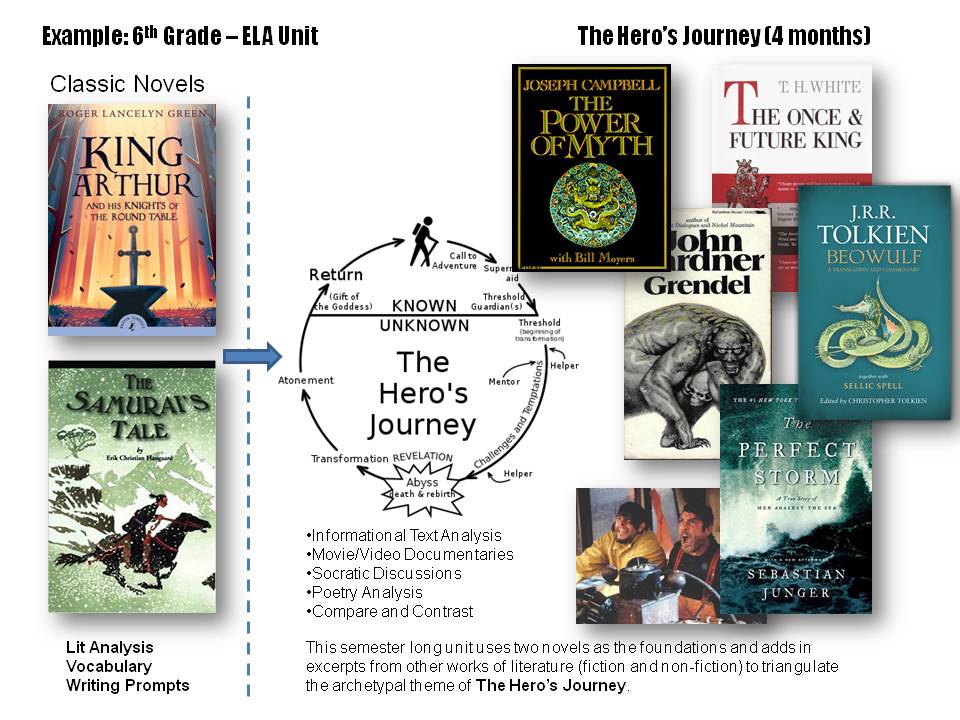
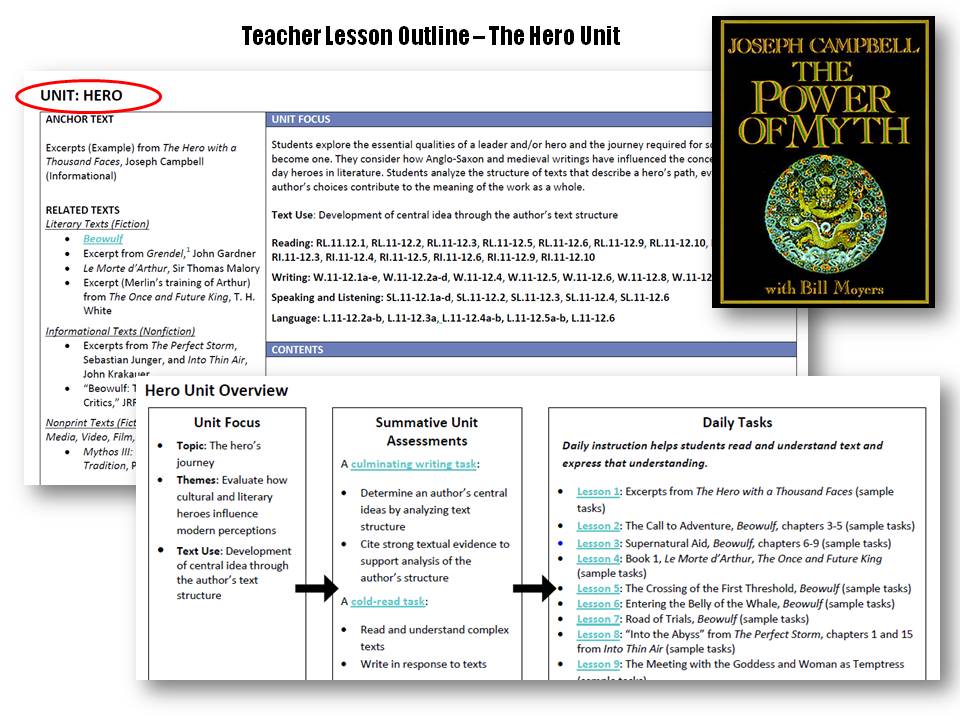
Classical ELA in a High School
The Rhetoric Stage
High School English literature classes at an Ethos Logos supported school, focus on studying classic novels; a mastery of major literature concepts; understanding and learning authors’ methods; expanding the scholar's vocabulary; and writing essays, critiques, opinions, and comparisons between various works, styles and historical connections. A Classically educated High School scholar will have advanced skills in interpreting, discussing, presenting and sharing their ideas. By the Rhetoric stage of the Trivium, students will have a deep understanding of historical context and be able to form their own opinions about the classic works of literature.
Junior English students write many projects to prepare them for their senior year and the SAT essay. Senior English students prepare for college through literature and vocabulary studies and write a Capstone thesis to culminate their year.
Novel studies include reading and discussing classic and contemporary novels. AP English prepares students to take the AP English Exam by studying the figurative language through poetry and prose, writing essays from classical and contemporary literature, and applying literary vocabulary to test-taking.
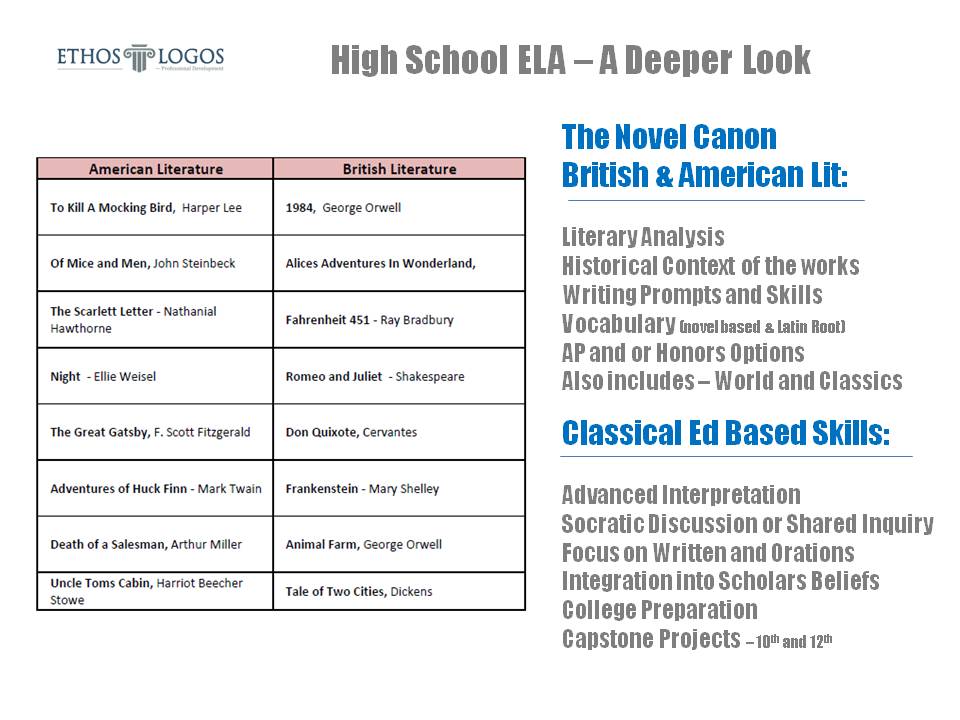
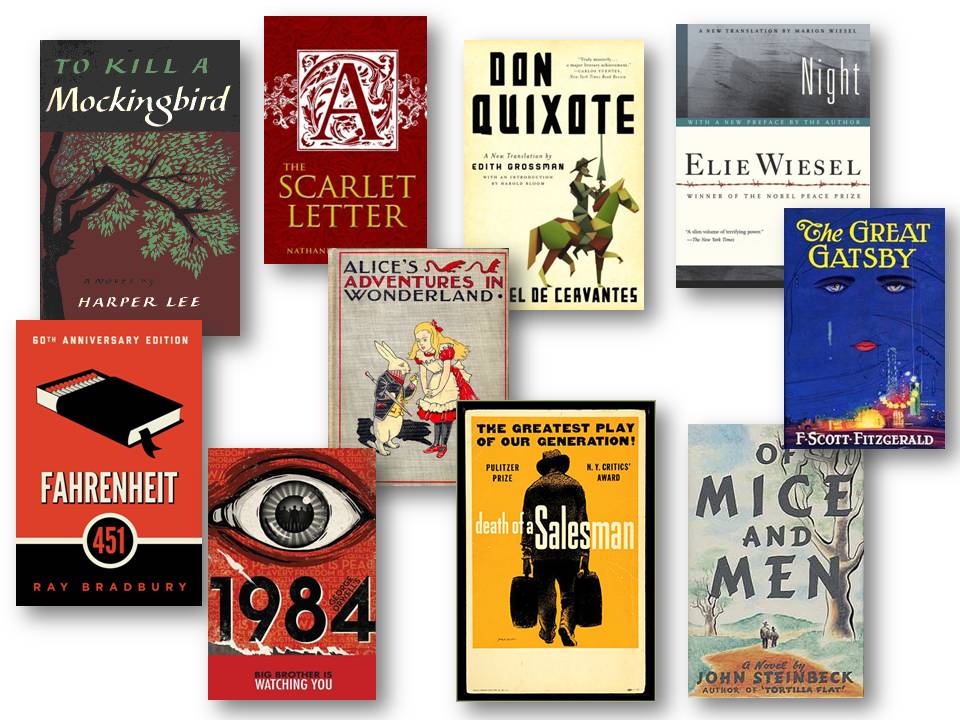
High School English – Language Arts Course Sequence
The English program follows a four-year cycle of American, British and World and Classic literature. Throughout the curriculum, there is an emphasis on developing speaking and writing skills through the analysis and discussion of literature. Students are trained to think logically and analyze literature constructively with their peers.
English 1 (Intro American Lit-Grammar Emphasis) 9th Grade 1 Credit
This course will focus on the great works of American literature. The focus of this course will be on literary analysis and beginning writing composition. Literature journals will be the bedrock of the course with the goal of assessing where incoming freshman are with respect to grammar readiness and basic writing comprehension.
English 2 British Lit (Composition Emphasis) 10th Grade 1 Credit
This course will focus on British based classical literature. The basic construction of ELA instruction will include weekly vocabulary expansion using the novels and text assigned. Students will focus on opinion and comparative writing techniques. Each novel will capstone with a first-person opinion analysis of the work including citation skills, composition structure and the students’ ability to orchestrate a well-formulated opinion about the work they are analyzing and be able to articulate their argument in writing.
English 3 World Lit (Composition Emphasis - Poetry) 11th Grade 1 Credit
This course will focus on Classical Literature from all time periods. Students will be required to read two classical novels from a provided list and two classical novels deemed appropriate by the class instructor. Poetry analysis will be taught in the second semester of this course year. Creative writing will be the focus of this course, with the students exploring themes and styles to express their feelings and emotions.
English 4 Classics (Speech, Debate) 12th Grade 1 Credit
This course will focus on Classical literature. There will be an integration of reading, writing, speaking, listening, and language skills using a thematic based approach. Students will work towards their capstone project with research skills, writing and speaking skills learned throughout their time in the school. This course will help prepare and monitor the progress of the Senior Capstone project.
Capstone Classics – Ethics - (Rhetoric 12th Grade) 1 Credit
As a culminating activity of a classical education, the Capstone Project continues the Medieval tradition put forth by Dorothy Sayers in ‘The Lost Tools of Learning.' The Senior Capstone Project allows the graduating class to display the mastery of their academic formation. Through the Senior Capstone process, each senior will research, present and defend their thesis.
The Great Books High School Series
The Great Books High School program combines high-quality literature, student-centered discussion, and activities that support reading comprehension, critical thinking, speaking and listening, and writing. We provide outstanding classroom materials and inspiring professional development. We help students get the most out of reading and interacting with their teachers and classmates while providing instruction and support in Shared Inquiry, a method of learning that gives teachers the approach they need to help their students succeed.
For more than 50 years, schools that integrate Great Books materials and our inquiry-based approach to learning into their curriculum have been helping their students become independent readers and thinkers while enhancing the instructional skills of their teachers.
- Balancing literary and informational texts
- Building knowledge in the disciplines
- Providing a staircase of text complexity
- Requiring text-based answers
- Focusing on evidence in writing
- Expanding vocabulary

The American Dream ELA Unit
This sample two month English unit combines the Great Gatsby novel with informational text, source documents, and poetry to let the students see all angles of what the American dream means to them. These units include detailed lesson plans to support the teachers in their effort to make the unit come alive.
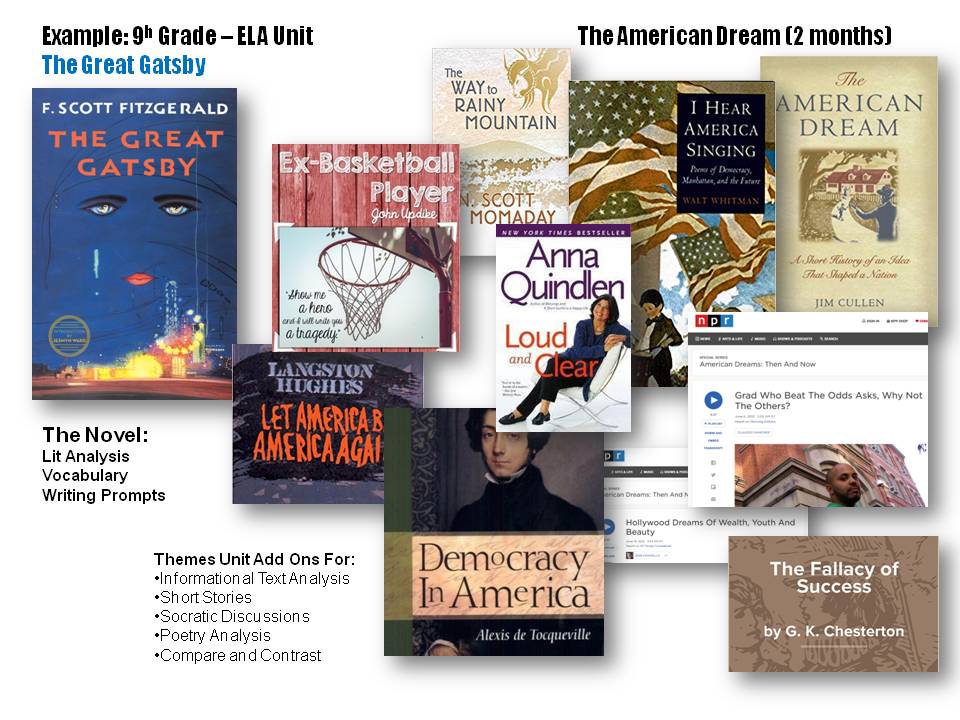
A Behind The Scenes Look At Huckleberry Finn
From Literary Analysis to Grammar to Writing Prompts
